Srishti Palani
Understanding, Protecting, and Augmenting Human Cognition with Generative AI: A Synthesis of the CHI 2025 Tools for Thought Workshop
Aug 28, 2025Abstract:Generative AI (GenAI) radically expands the scope and capability of automation for work, education, and everyday tasks, a transformation posing both risks and opportunities for human cognition. How will human cognition change, and what opportunities are there for GenAI to augment it? Which theories, metrics, and other tools are needed to address these questions? The CHI 2025 workshop on Tools for Thought aimed to bridge an emerging science of how the use of GenAI affects human thought, from metacognition to critical thinking, memory, and creativity, with an emerging design practice for building GenAI tools that both protect and augment human thought. Fifty-six researchers, designers, and thinkers from across disciplines as well as industry and academia, along with 34 papers and portfolios, seeded a day of discussion, ideation, and community-building. We synthesize this material here to begin mapping the space of research and design opportunities and to catalyze a multidisciplinary community around this pressing area of research.
Orchid: Orchestrating Context Across Creative Workflows with Generative AI
Aug 27, 2025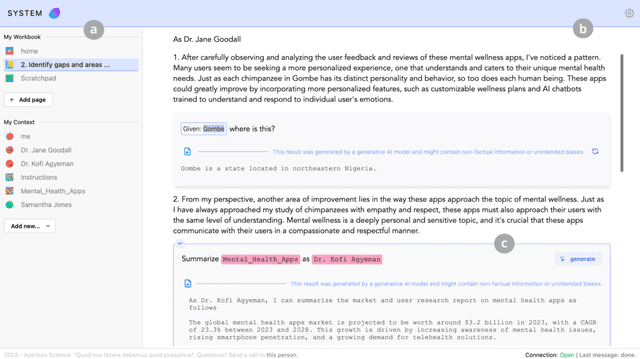
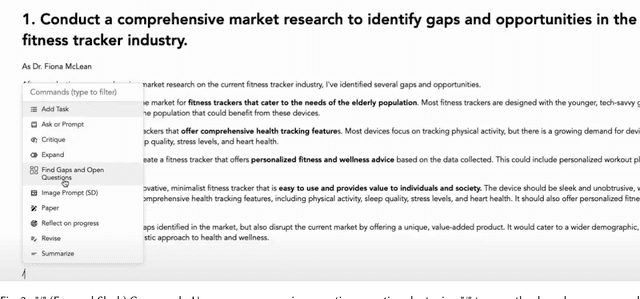

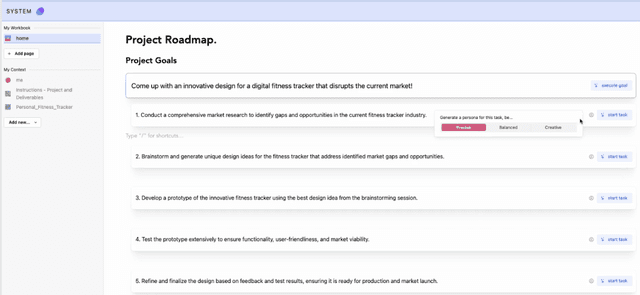
Abstract:Context is critical for meaningful interactions between people and Generative AI (GenAI). Yet mainstream tools offer limited means to orchestrate it, particularly across workflows that span multiple interactions, sessions, and models, as often occurs in creative projects. Re specifying prior details, juggling diverse artifacts, and dealing with context drift overwhelm users, obscure intent, and curtail creativity. To address these challenges, we present Orchid, a system that gives its users affordances to specify, reference, and monitor context throughout evolving workflows. Specifically, Orchid enables users to (1) specify context related to the project, themselves, and different styles, (2) reference these via explicit mentions, inline selection, or implicit grounding, and (3) monitor context assigned to different interactions across the workflow. In a within-subjects study (n=12), participants using Orchid to execute creative tasks (compared to a baseline toolkit of web search, LLM-based chat, and digital notebooks) produced more novel and feasible outcomes, reporting greater alignment between their intent and the AI's responses, higher perceived control, and increased transparency. By prioritizing context orchestration, Orchid offers an actionable step toward next generation GenAI tools that support complex, iterative workflows - enabling creators and AI to stay aligned and augment their creative potential.
Sensecape: Enabling Multilevel Exploration and Sensemaking with Large Language Models
May 19, 2023



Abstract:People are increasingly turning to large language models (LLMs) for complex information tasks like academic research or planning a move to another city. However, while they often require working in a nonlinear manner - e.g., to arrange information spatially to organize and make sense of it, current interfaces for interacting with LLMs are generally linear to support conversational interaction. To address this limitation and explore how we can support LLM-powered exploration and sensemaking, we developed Sensecape, an interactive system designed to support complex information tasks with an LLM by enabling users to (1) manage the complexity of information through multilevel abstraction and (2) seamlessly switch between foraging and sensemaking. Our within-subject user study reveals that Sensecape empowers users to explore more topics and structure their knowledge hierarchically. We contribute implications for LLM-based workflows and interfaces for information tasks.
The Semantic Reader Project: Augmenting Scholarly Documents through AI-Powered Interactive Reading Interfaces
Mar 25, 2023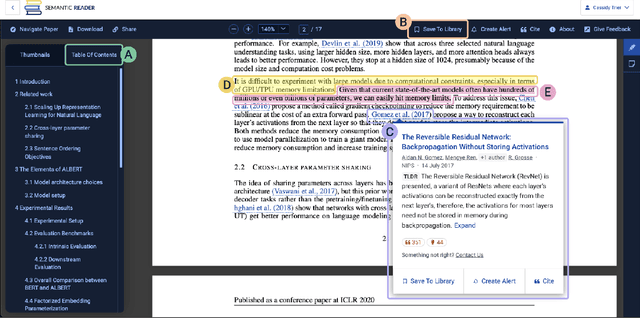
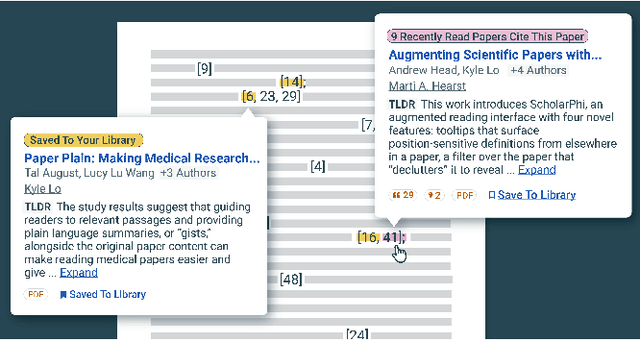
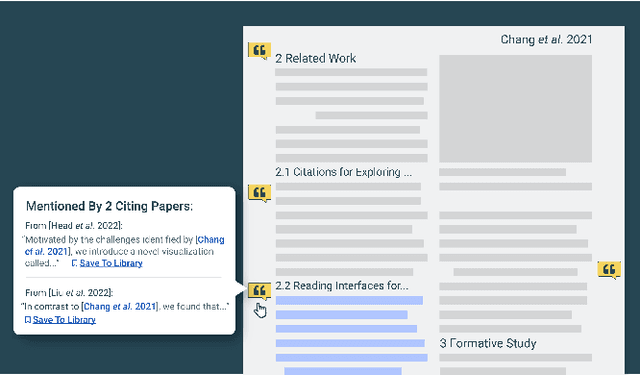
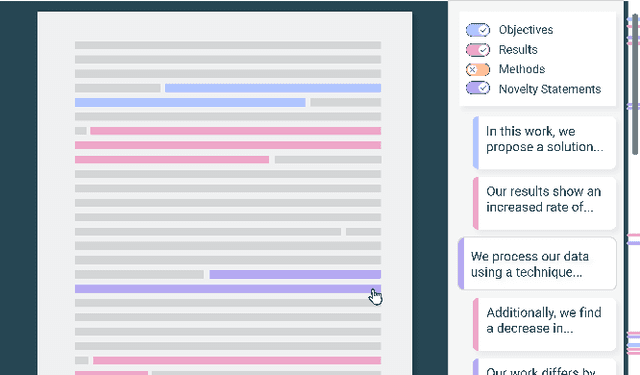
Abstract:Scholarly publications are key to the transfer of knowledge from scholars to others. However, research papers are information-dense, and as the volume of the scientific literature grows, the need for new technology to support the reading process grows. In contrast to the process of finding papers, which has been transformed by Internet technology, the experience of reading research papers has changed little in decades. The PDF format for sharing research papers is widely used due to its portability, but it has significant downsides including: static content, poor accessibility for low-vision readers, and difficulty reading on mobile devices. This paper explores the question "Can recent advances in AI and HCI power intelligent, interactive, and accessible reading interfaces -- even for legacy PDFs?" We describe the Semantic Reader Project, a collaborative effort across multiple institutions to explore automatic creation of dynamic reading interfaces for research papers. Through this project, we've developed ten research prototype interfaces and conducted usability studies with more than 300 participants and real-world users showing improved reading experiences for scholars. We've also released a production reading interface for research papers that will incorporate the best features as they mature. We structure this paper around challenges scholars and the public face when reading research papers -- Discovery, Efficiency, Comprehension, Synthesis, and Accessibility -- and present an overview of our progress and remaining open challenges.
Relatedly: Scaffolding Literature Reviews with Existing Related Work Sections
Feb 13, 2023Abstract:Scholars who want to research a scientific topic must take time to read, extract meaning, and identify connections across many papers. As scientific literature grows, this becomes increasingly challenging. Meanwhile, authors summarize prior research in papers' related work sections, though this is scoped to support a single paper. A formative study found that while reading multiple related work paragraphs helps overview a topic, it is hard to navigate overlapping and diverging references and research foci. In this work, we design a system, Relatedly, that scaffolds exploring and reading multiple related work paragraphs on a topic, with features including dynamic re-ranking and highlighting to spotlight unexplored dissimilar information, auto-generated descriptive paragraph headings, and low-lighting of redundant information. From a within-subjects user study (n=15), we found that scholars generate more coherent, insightful, and comprehensive topic outlines using Relatedly compared to a baseline paper list.
 Add to Chrome
Add to Chrome Add to Firefox
Add to Firefox Add to Edge
Add to Edge